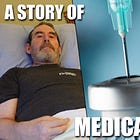Insider: Unidentified Nurse Tells The True Story Inside COVID ICUs
A firsthand account of the failures of hospital protocols, staffing shortages, and conflicts of interest during COVID
In this courageous interview, an unnamed nurse recounts her experience during the Delta wave in 2021, when she was redeployed to an ICU. Her account raises concerns about protocols, patient care, staffing shortages, and financial incentives interfering in hospital practices. By sharing what she witnessed, despite professional and personal risks, she offers a sobering glimpse into how hospital systems responded during the COVID crisis.
Thank you to the Children's Health Defense for hosting this interview and helping to bring the truth to light.
ICUs During the Delta Surge
The nurse described being assigned to a 12-bed ICU after elective surgeries were suspended. Almost every patient admitted with COVID symptoms was placed on a ventilator following a predictable sequence: discharge from the emergency room, return without treatment, administration of remdesivir, steady deterioration, and eventual intubation.
Patients often progressed from high-flow oxygen to masks, then to sedation with precedex, which caused confusion and what nurses called “COVID delirium.” Many patients became agitated, pulled off their masks, removed IV lines, and went without food or water. According to her, one to two patients died daily, with dialysis machines constantly in use as many developed kidney failure.
Lack of Dialogue and Growing Fear
Clinical discussion among staff was almost non-existent, replaced by rigid adherence to national protocols. Doctors, often younger and from rigid education programs, seemed unwilling to question the guidelines. According to the nurse, many expressed hostility toward the “unvaccinated,” even showing videos portraying them as the root of the problem.
She emphasized that this emotional climate stifled critical thinking and deepened the fear that spread throughout the unit. In her view, the true contagion was fear, reinforced by a culture where questioning protocols was discouraged and even personal relationships between medical staff became less important.
Medical Records and Reporting Practices
The testimony raised questions about how “vaccination” status was recorded. She said that charts regularly listed “COVID pneumonia in an unvaccinated host,” but never once did she see “vaccinated host.” She added that, according to nurses who worked inside the Epic electronic medical record system, there was no drop-down option for “vaccinated” patients, only “unvaccinated” or “unknown.” Staff were rarely in a position to ask families directly about injection status, given the sensitivity of the subject during critical moments.
Staffing Shortages and Patient Neglect
Another major issue was unsafe nurse-to-patient ratios. Instead of the standard two-to-one ratio, many ICUs operated at three-to-one. This, she testified, contributed to neglect: patients left without bowel movements for days, others developing ruptures, bedsores, or severe deterioration. Families arriving late in the process sometimes found loved ones in shocking condition — unwashed, unfed, or in restraints. She recalled one instance of her advice being ignored by a doctor who instead insisted on placing a patient in a prone position, despite adequate oxygen saturation. This led to cardiac arrest and death within an hour.
Incentives and Systemic Pressures
The nurse also pointed to monetary incentives, noting that hospitals were paid more for COVID diagnoses, the use of remdesivir, and deaths attributed to the virus. She highlighted that utilization review rules were suspended during the public health emergency, allowing hospitals to bill for patients occupying beds without receiving treatment. While she did not have a full picture, being outside of the financial sector, it was clear to her that monetary incentives were shaping care.
Ethical Concerns and Personal Consequences
In her assessment, once it became evident that protocols were failing, the decision to continue them without modification constituted malpractice. She noted that families often believed their loved ones had been lost to the protocols themselves and stated that she understood such conclusions, even if she was not in a position to legally confirm them.
Closing Words
The nurse closed by affirming that while speaking out carries risks, the courage to tell the truth is essential. Her testimony highlights the need for accountability, transparency, and the willingness to speak out against corrupt agendas.








I'm finding myself in a strange and lonely place when it comes to conventional healthcare. I rebelled against it at an early age when I started seeing discrepancies in the widely held view that it was the best and only way to go when illness strikes. Curiosity drove me to question the dogma and the narrow minded outlook of drug based medicine. I was fascinated by nutrition and biology at the cellular level and it offered an alternative way to understand health.
My mother, a nurse once, believed in the system and my father, diabetic, believed it was great as well. Everybody around me just accepted the notion that doctors were like gods, experts with years of training, deserving of great trust.
In 2002 both parents died suddenly under hospital care, and soon after my two brothers died, both of them immersed in drug based protocols with multiple health problems. I was left alone in my family struggling to understand why. I was the only survivor, the rebel who now avoided and feared hospitals.
Since then I've continued to learn the basis of health, and implement my own protocols based on my own research. I don't get sick much though, don't take prescriptions, try to eat and live healthy and I'm glad to be alive and well. I immediately realized covid was a scam and the vaccine a bioweapon.
I think healthcare is sinking, losing it's relevance and respectability especially after covid. I have great respect for doctors like Trozzi speaking out and showing us the way. If people were taught to take control of their own health instead of trusting it to the profit driven system they could escape the nightmare of modern "healthcare."
The Plandemic Nazis are at it again by carbon copy of their actions 6 years ago and on this post. Labs around the world continue to manufacture the bird flu they purposely created through reckless genetic engineering. The U.N. is setting the stage for mass-coordinated countermeasures—vaccines and surveillance systems—over the next 3 days, before their next intentionally created "outbreak" they created on purpose even begins. The UN means United Nazis to me, and should mean that to anybody who realizes what these mass-murderers are up to again! They and their mass-murdering partners in the WEF and WHO cults plan to murder 7 billion while they hideout in underground cities they built with our taxes. They have now placed laws in Canada that when they announce their new plandemic, non-compliance of their new fake vax means prison camps this time around, no doubt worse than their fake hospitals last time described on this post. All this again, even though there is no scientific evidence whatsoever their lies meant anything last time or will mean anything this time in the real world.